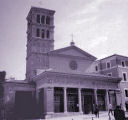22. Saying, The Son of man must suffer many things, and be rejected of the elders and Chief Priests and Scribes, and be slain, and be raised the third day.
CYRIL; It was the duty then of the disciples to preach Him throughout the world. For this was the work of those who were chosen by Him to the office of the Apostleship. But as holy Scripture bears witness, There is a time for every thing. For it was fitting that the cross and resurrection should be accomplished, an d then should follow the preaching of the Apostles; as it is spoken, saying, The Son of man must needs suffer many things.
AMBROSE; Perhaps because the Lord knew that the disciples would believe even the difficult mystery of the Passion and Resurrection, He wished to be Himself the proclaimer of His own Passion and Resurrection.
23. And he said to them all, If any man will come after me, let him deny himself, and take up his cross daily, and follow me.
24. For whosoever will save his life shall lose it but whosoever will lose his life for my sake, the same shall save it.
25. For what is a man advantaged, if he gain the whole world, and lose himself, or be cast away?
CYRIL; Great and noble leaders provoke the mighty in arms to deeds of velour, not only by promising them the honors of victory, but by declaring that suffering is in itself glorious. Such we see is the teaching of the Lord Jesus Christ. For He had foretold to His disciples, that He must needs suffer the accusations of the Jews, be slain, and rise again on the third day. Lest then they should think that Christ indeed was to suffer persecution for the life of the world, but that they might lead a soft life, He shows them that they must needs pass through similar struggles, if they desired to obtain His glory. Hence it is said, And he said to all.
THEOPHYL; He rightly addressed Himself to all, since He treats of the higher things (which relate to the belief in His birth and passion) apart with His disciples.
CHRYS. Now the Savior of His great mercy and loving kindness will have no one serve Him unwillingly and from constraint, but those only who come of their own accord, and are grateful for being allowed to serve Him. And so not by compelling men and putting a yoke upon them, but by persuasion and kindness, He draws to Him every where those who are willing, saying, If any man will, &c.
BASIL; But He has left His own life for an example of blameless conversation to those who are willing to obey Him; as He says, Come after me, meaning thereby not a following of His body, for that would be impossible to all, since our Lord is in heaven, but a due imitation of His life according to their capacities.
THEOPHYL; Now unless a man renounces himself, he comes not near to Him, who is above him; it is said therefore, Let him deny himself.
BASIL; A denial of one's self is indeed a total forgetfulness of things past, and a forsaking of his own will ill anti affection
ORIGEN; A man also denies himself when by a sufficient alteration of manners or a good conversation he changes a life of habitual wickedness. He who has long lived in lasciviousness, abandons his lustful self when he becomes chaste, and in like manner a forsaking of any crimes is a denial of one's self.
BASIL; Now a desire of suffering death for Christ and a mortification of one's members which are upon the earth, end a manful resolution to undergo any danger for Christ, and an indifference towards the present life, this it is to take up one's cross. Hence it is added, And let him take up his cross daily.
THEOPHYL. By the cross, He speaks of an ignominious death, meaning, that if any one will follow Christ, he must not for his own sake flee from even an ignominious death.
GREG. In two ways also is the cross taken up, either when the body is afflicted through abstinence, or the mind touched by sympathy.
GREEK EX. He rightly joins these two, Let him deny himself, and let him take up his cross, for as he who is prepared to ascend the cross conceives in his mind the intention of death, and so goes on thinking to have no more part in this life, so he who is willing to follow our Lord, ought first to deny himself, and so take up his cross, that his will may be ready to endure every calamity.
BASIL; Herein then stands a man's perfection, that he should have his affections hardened, even towards life itself, and have ever about him the answer of death, that he should by no means trust in himself. But perfection takes its beginning from the relinquishment of things foreign to it; suppose these to be possessions or vain-glory, or affection for things that profit not.
THEOPHYL; We are bid then to take up the cross of which we have above spoken, and having taken it, to follow our Lord who bore His own cross. Hence it follows, And let him follow me.
ORIGEN; He assigns the cause of this when He adds, For whosoever will save his life shall lose it; that is, whosoever will according to the present life keep his own soul fixed on things of sense, the same shall lose it, never reaching to the bounds of happiness. But on the other hand He adds, but whosoever shall lose his life for my sake, shall save it. That is, whosoever forsakes the things of sense looking upon truth, and exposes himself to death, as it were losing his life for Christ, shall the rather save it. If then it is a blessed thing to save our life, (with regard to that safety which is in God,) there must be also a certain good surrender of life which is made by looking upon Christ. It seems also to me from resemblance to that denying of one's self which has been before spoken of, that it becomes us to lose a certain sinful life of ours, to take up that which is saved by virtue.
CYRIL; But that incomparable exercise of the passion of Christ, which surpasses the delights and precious things of the world, is alluded to when he adds, What is a man advantaged, if he gain the whole world and lose himself, or be a cast away? As if he says, When a man, through his looking after the present delights, gains pleasure, and refuses indeed to suffer, but chooses to live splendidly in his riches, what advantage will he get then, when he has lost his soul? For the fashion of this world passes away, and pleasant things depart as a shadow. For the treasures of ungodliness shall not profit, but righteousness snatches a man from death.
GREG. Since then the holy Church has one time of persecution, another time of peace, our Lord has noticed both times in His command to us. For at the time of persecution we must lay down our soul, that is our life, which He signified, saying, Whosoever shall lose his life. But in time of peace, those things which have the greatest power to subdue us, our earthly desires, must be vanquished; which He signified, saying, What does it profit a man, &c. Now we commonly despise all fleeting things, but still we are so checked by that feeling of shame so common to man, that we are yet unable to express in words the uprightness which we preserve in our hearts.
But to this wound the Lord indeed subjoins a suitable application, saying, For whoever shall be ashamed of me and my words, of him shall the Son of man be ashamed.
Catena Aurea Luke 9

 Polycarp had known those who had known Jesus, and was a disciple of St. John the Apostle, who had converted him around the year 80 AD. He taught, says his own pupil Irenaeus of Lyons, the things that he learned from the Apostles, which the Church hands down, which are true. Irenaeus, who as a young boy knew Polycarp, praised his gravity, holiness, and majesty of countenance. He had lived near Jerusalem and was proud of his early associations with the Apostles.
Polycarp had known those who had known Jesus, and was a disciple of St. John the Apostle, who had converted him around the year 80 AD. He taught, says his own pupil Irenaeus of Lyons, the things that he learned from the Apostles, which the Church hands down, which are true. Irenaeus, who as a young boy knew Polycarp, praised his gravity, holiness, and majesty of countenance. He had lived near Jerusalem and was proud of his early associations with the Apostles.  "The memory of that time when as a youth I was with Polycarp in Asia Minor is as fresh in my mind as the present. Even now I could point to the place where he sat and taught, and describe his coming and going, his every action, his outward appearance, and his manner of discourse to the people. It seems as though I still heard him tell of his association with the apostle John and with others who saw the Lord, and as though he were still relating to me their words and what he heard from them about the Lord and His miracles. . . ."
"The memory of that time when as a youth I was with Polycarp in Asia Minor is as fresh in my mind as the present. Even now I could point to the place where he sat and taught, and describe his coming and going, his every action, his outward appearance, and his manner of discourse to the people. It seems as though I still heard him tell of his association with the apostle John and with others who saw the Lord, and as though he were still relating to me their words and what he heard from them about the Lord and His miracles. . . ." Today's station is at St. George's. Pope St. Gregory established a diaconia, an institution that cared for the poor, at the site of this church. The area has a special place in the history of Rome, as an ancient tradition claims that it was here that Romulus killed his brother Remus before founding the city.
Today's station is at St. George's. Pope St. Gregory established a diaconia, an institution that cared for the poor, at the site of this church. The area has a special place in the history of Rome, as an ancient tradition claims that it was here that Romulus killed his brother Remus before founding the city.

